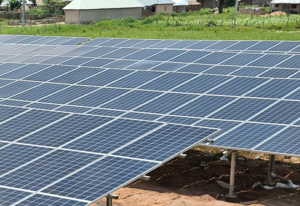Resource centre
Mini-grids position paper published

REPP and partners advise on improving the mini-grid enabling environment in Nigeria
A multi-stakeholder position paper co-authored by the Camco-managed Renewable Energy Performance Platform (REPP) was published today, setting out a series of recommendations on how to improve the bankability of Nigeria’s mini-grid policy and regulatory framework.
Mini-grids are widely recognised as being central to the successful implementation of Nigeria’s energy access and sustainable energy goals, and a series of policy and regulatory developments over recent years have established the country as one of the leading mini-grid markets in Africa.
The mini-grid sector is a fast-changing space, however, and energy sector policies, regulations and governance need to be evolving to support its continued growth.
In response to this, the Nigerian Electricity Regulatory Commission (NERC) in September 2022 initiated an official review of its 2016 mini-grid regulations, which were created to provide a comprehensive set of guidelines covering a broad range of issues, from mini-grid licensing to quality standards and tariff design.
Today’s position paper, Future-proofing the expanding market: Recommendations for improving the bankability of the mini-grid regulatory framework in Nigeria, forms part of the review’s open consultation. It was led by UK government-funded REPP alongside the Renewable Energy Association of Nigeria (REAN), and the Africa Mini-grid Developers Association (AMDA), and supported by multiple private sector stakeholders leading the development of the Nigerian mini-grid market.
The position paper takes stock of what has worked so far in Nigeria’s mini-grid sector and what requires further improvement or updating to ensure the bankability of the sector’s regulatory and policy frameworks and their practical implementation. Specifically, the paper aims to explore the identified gaps and lack of clarity – in both the regulations and policy – that are slowing down the scaling of the sector and to propose ways for further improvement.
The recommendations are based on several years of collective experience in developing, financing, and operating mini-grids in Nigeria, and include contributions from many of the key stakeholders driving Nigeria’s mini-grid sector’s growth today.
Ieva Indriunaite, Policy and Partnerships Manager at Camco, said: “Nigeria is a trailblazer in mini-grid market development on the continent in many respects and has achieved significant progress over the past six years in mobilising private capital to support its national electrification vision. But despite significant progress, scaling up mini-grid sector development to successfully achieve Nigeria’s energy access targets will require further strengthening of the bankability of the current policy and regulatory framework.
“We keenly welcome NERC’s ongoing review of the 2016 regulations, as well as other ongoing efforts to support the enabling environment for mini-grids in Nigeria, and hope that the recommendations in this paper will help lead to an improved policy and regulatory framework – as well as the processes related to their implementation – that will enable the rapid scaling up of the sector.”
An initial version of the paper was submitted to NERC and other key public sector stakeholders in July 2021. Today’s updated version considers market developments over the past year and the recent NERC consultation. Based on the feedback received, NERC will draft an update to the regulations, which it aims to present for the government’s approval in January 2023.

